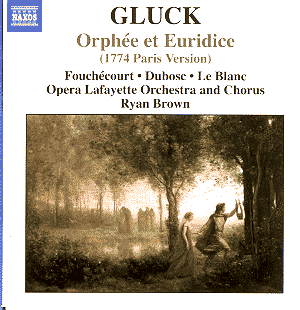Gluck’s reform opera
exists in two different versions by
his own hand plus a much later version
by Hector Berlioz. The original, written
for Vienna in 1762, was in Italian and
the title part was written for a castrato.
Then in 1774 he revised and expanded
it for Paris with the title part for
tenor voice. In 1859 Hector Berlioz
made his version, again for Paris, and
with the title part for contralto. This
version has become more or less the
standard, although translated back into
Italian. It is also the version which
has been recorded most often, but there
have been amendments and permutations
so one can safely say that there has
never been a "standard" Orpheus.
Here though we have a Paris Orphée
in what can be labelled the original
layout, since the recording is based
upon what was heard in Paris on 2nd
August 1774. The conductor, Ryan Brown,
has consulted the performing materials
for that event and decided that this
is what Gluck had expected to hear.
This includes the arietta L’espoir
renaît in act 1, which was
not performed at the premiere since
the tenor Legros obviously wasn’t up
to the technical demands of the aria;
Jean-Paul Fouchécourt definitely
is.
There have been a couple
of earlier recordings of the Paris version:
in the 1950s both Leopold Simoneau and
Nicolai Gedda starred in the title part.
I haven’t heard the Simoneau and didn’t
have Gedda’s at hand for comparison
but at least I had two of the great
arias on a portrait disc. On this evidence
I could at once decide that Gedda’s
is a more starry performance but that
stylistically Fouchécourt has
nothing to fear. Gedda’s is a 19th
century hero while Fouchécourt
belongs in the right century. His is
a most winning assumption of the title
part: beautiful, light of voice, agile
and keen on words. His coloratura singing
is beyond reproach and he embellishes
the third stanza of J’ai perdu mon
Euridice ("Che faro senza Euridice"
in the more well-known Italian version)
delicately but unobtrusively. It
isn’t a big voice but it is flexible
and feels "right". It is difficult
to imagine a better interpretation.
This recording actually
a winner in most respects. It is lively
and rhythmically alert with splendid
playing on period instruments and the
chorus is also very good. It is a dramatic
performance of a work that can easily
become boring. Here though it oozes
life. The overture at once tells us
that this is not going to be a sleeping-pill.
And listen to the introduction to act
2, where Brown enhances the darkness
of the orchestral writing and makes
us feel very close to Hades – maybe
too close for comfort. The Dance of
the Furies, which ends the second act,
is appropriately menacing at a rollicking
speed – a contradiction in terms, maybe
– and the Dance of the Blessed Spirits
in the Elysian Fields is gently rocking
with fine flute playing by – I suppose
– Colin St. Martin. The introduction
to Euridice’s short air Cet asile
is played with the lilt of a group of
folk music fiddlers. Absolutely enchanting!
Of the three soloists
Orphée carries the heaviest burden,
and it is, as I have already implied,
executed quite marvellously by Jean-Paul
Fouchécourt. Suzie Le Blanc,
sings the small part of Amour as well
as anyone I know. When it comes to Catherine
Dubose I am in two minds. She has a
quite penetrating, powerful and vibrant
voice that threatens to swamp Orphée
in their big act three duet, and they
don’t blend too well. On the other hand
she can sing softly and sincerely and
can use her vibrato as a means of expression.
Still she sounds more at home in the
19th century. But of course
every performance and recording of this
opera stands or falls on the singing
of the eponymous hero. Whatever the
merits of the Simoneau and Gedda sets
(both in mono only), the one under consideration
now has to be recommended to anyone
wanting the Paris version. The booklet
has a very good essay by Ryan Brown
concerning what is included and why.
There is a further essay about Gluck
and Reform Opera by the indefatigable
Keith Anderson (he must by now have
contributed to the general listeners’
knowledge of music more than anyone
in history) who also presents a good
synopsis. Add to this the complete French
text plus an English translation and
everything in the garden would have
been lovely, were it not for the fact
that there are far too few tracks. The
first CD has 6, the second only 4, meaning
for instance that to listen to Orphée’s
J’ai perdu mon Euridice, which
I suppose everybody wants to, especially
when it is so marvellously sung, you
have to programme in track 3 of CD 2
and then "fast forward" to
13’31, which on my machine takes at
least five minutes. Whoever made this
decision it was extremely user-unfriendly
and merits a skull-and-crossbones marking.
Otherwise this is "must-buy".
Göran Forsling














